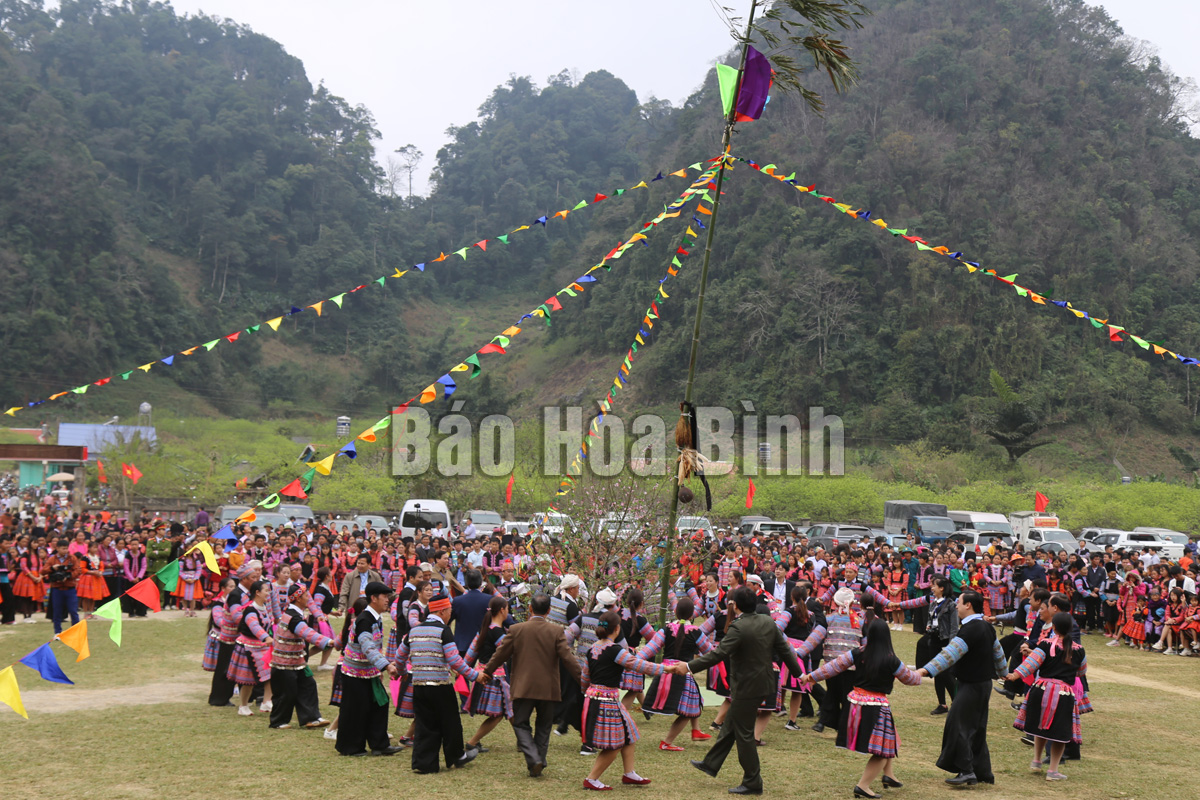
(HBĐT) - April 19 is the annual Ethnic Cultural Day in Vietnam, celebrated since the 2008 Prime Minister’s Decision No. 1668/QD-TTg, and Hoa Binh province played host to a variety of cultural activities to recognize the day.

Gau Tao Festival of the Mong people of Hang Kia and Pa Co communes (Mai Chau
district) attracts a large number of people.
Hoa Binh is home to six main ethnic groups, and
each is paid homage by exhibitions of their costumes, music, customs, and
festivals. The resolution of the provincial Party Congress for the 2020-25
recognizes culture as one of the driving forces for the province’s
socio-economic development.
In implementing the resolutions of 13th national Party
Congress and the 17th provincial Party Congress for the 2020-2025
tenure, Hoa Binh continues to compile a scientific dossier for UNESCO in
recognition of the Mo Muong epic as intangible cultural heritage.
The provincial People's Committee recently
issued a plan to implement a project on preserving intangible cultural values
of indigenous groups in Hoa Binh from 2020 to 2030. The local ethnic groups
include the Muong, Thai, Tay, Dao and Mong peoples in 10 districts and cities
in the province.
This year's Vietnam Ethnic Culture Day marks the
90th anniversary of global recognition of the Hoa Binh culture. To commemorate
the day, the province will introduce a thematic exhibition of 500 original stone
and bone artifacts, along with 100 documentary photos depicting Hoa Binh culture.
This year’s Ethnic Culture Day is an opportunity
to educate people on the traditions, national pride and sense of responsibility
for preserving and promoting national cultural traditions. These acts contribute
to consolidate and strengthen national unity by honouring the cultural identity
of ethnic groups. This is also an opportunity for ethnic groups in the
community to understand each other, to unite for economic development, and to
preserve the fine traditions of the past./.
With an increasingly vibrant and widespread emulation movement aimed at building cultured residential areas and cultured families, Yen Thuy District has been making steady progress toward improving both the material and spiritual well-being of its people, while fostering a civilized, prosperous, beautiful, and progressive community.
Once lacking recreational spaces and community facilities, Residential Group 2 in Quynh Lam Ward (Hoa Binh City) has recently received attention for the construction of a new, spacious, and fully equipped cultural house. The project followed the model of state support combined with public contributions in both labor and funding.
The "All people unite to build cultural life" movement, which has been effectively integrated with Kim Boi district’s socio-economic development goals, is fostering a lively spirit of emulation across local residential areas, hamlets, villages, public agencies, and enterprises. In addition, through the initiative, traditional cultural values are being preserved and promoted, while community solidarity and mutual support in poverty reduction and economic development are being strengthened.
A working delegation of the Hoa Binh provincial People’s Committee led by its Permanent Vice Chairman Nguyen Van Toan on June 11 inspected the progress of a project to build the Mo Muong Cultural Heritage Conservation Space linked to tourism services in Hop Phong commune, Cao Phong district.
Born and growing in the heroic land of Muong Dong, Dinh Thi Kieu Dung, a resident in Bo town of Kim Boi district, in her childhood was nurtured by the sweet lullabies of her grandmother and mother. These melodies deeply imprinted on her soul, becoming an inseparable part of her love for her ethnic group's culture. For over 20 years, this love for her hometown has driven Dung to research, collect, and pass down the cultural values of the Muong people to future generations.
In the final days of May, the Ethnic Art Troupe of Hoa Binh Province organized performances to serve the people in remote, mountainous, and particularly disadvantaged areas within the province. These were not just ordinary artistic shows, but they were the meaningful journeys aimed at spreading cultural values, enhancing the spiritual life of the people and contributing to the preservation of ethnic minority cultural identities.



